After reading a spellbinding 2000+ pages fantasy trilogy I needed something light and funny. The Unadulterated Cat did the trick perfectly. This book is about what Real cats should be, and also what they shouldn't be. About what they do, and eat, what to call them, etc.
No doubt you will enjoy this book, even if you don't have a cat (I don't). It's got good ole witty Pratchett style, with the habitual footnotes, and Gray Jolliffe's cartoons are terrific. It's read in no time and and will have you bursting out laughing incontrollably.
A treat!
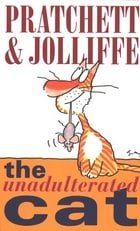 Posted : 19 years ago on 16 June 2006 10:42
(A review of The Unadulterated Cat)
Posted : 19 years ago on 16 June 2006 10:42
(A review of The Unadulterated Cat) 0 comments, Reply to this entry
0 comments, Reply to this entry
Enjoyable.
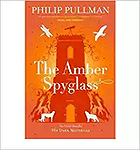 Posted : 19 years ago on 16 June 2006 10:41
(A review of The Amber Spyglass (His Dark Materials, Book 3))
Posted : 19 years ago on 16 June 2006 10:41
(A review of The Amber Spyglass (His Dark Materials, Book 3))This is the third and last book in the His Dark Materials trilogy (after Northern Lights, or The Golden Compass in the US, and The Subtle Knife).
This volume starts just where the previous left off: after the conflagration on the hills near Città gazze, Lyra is nowhere to be found. Looking for her, Will meets two Angels, Balthamos and Baruch, who urge him to bring the Subtle Knife to Lord Asriel. He promises to help them, as soon as he's recued Lyra.
Lyra is actually in another world, where Mrs. Coulter is keeping her asleep with drugs, and telling the local population that she's a holy woman and that she's trying to heal Lyra, so as to be left alone and unquestioned. Soon though, with the help of a little village girl named Ama and of two tiny spies in the service of Lord Asriel, Gallivespians known as the Chevalier Tialys and the Lady Salmakia, Will finds her again and saves her.
But now the most dangerous part of the journey begins, because both children want to go to the Land of the Dead, to make amends and try to rescue Roger and Will's father.
As for Dr. Mary Malone, who crossed into Città gazze and then in yet another world, she meets a strange people called the Mulefa. Living with them for some time, she finally learns their language, make friends and discover they also know about sraf, the Shadow particles she was studying in her laboratory, or what Lyra calls Dust. She'll build a spyglass to see sraf and understansd its purpose.
Meanwhile, Father Gomez, an emissary of the Church, is on a Holy mission to kill Lyra, to prevent her from committing the original sin again.
I still don't know what to think of these books. The story is sometimes very moving, with some heart-wrenching passages, but the rest is sometimes dull and not very believable. I didn't think this final book tied up all loose ends either. It was enjoyable, but I wouldn't call His Dark Materials my favourite series.
This volume starts just where the previous left off: after the conflagration on the hills near Città gazze, Lyra is nowhere to be found. Looking for her, Will meets two Angels, Balthamos and Baruch, who urge him to bring the Subtle Knife to Lord Asriel. He promises to help them, as soon as he's recued Lyra.
Lyra is actually in another world, where Mrs. Coulter is keeping her asleep with drugs, and telling the local population that she's a holy woman and that she's trying to heal Lyra, so as to be left alone and unquestioned. Soon though, with the help of a little village girl named Ama and of two tiny spies in the service of Lord Asriel, Gallivespians known as the Chevalier Tialys and the Lady Salmakia, Will finds her again and saves her.
But now the most dangerous part of the journey begins, because both children want to go to the Land of the Dead, to make amends and try to rescue Roger and Will's father.
As for Dr. Mary Malone, who crossed into Città gazze and then in yet another world, she meets a strange people called the Mulefa. Living with them for some time, she finally learns their language, make friends and discover they also know about sraf, the Shadow particles she was studying in her laboratory, or what Lyra calls Dust. She'll build a spyglass to see sraf and understansd its purpose.
Meanwhile, Father Gomez, an emissary of the Church, is on a Holy mission to kill Lyra, to prevent her from committing the original sin again.
I still don't know what to think of these books. The story is sometimes very moving, with some heart-wrenching passages, but the rest is sometimes dull and not very believable. I didn't think this final book tied up all loose ends either. It was enjoyable, but I wouldn't call His Dark Materials my favourite series.
 0 comments, Reply to this entry
0 comments, Reply to this entry
More gripping.
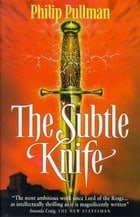 Posted : 19 years ago on 16 June 2006 10:40
(A review of The Subtle Knife (His Dark Materials))
Posted : 19 years ago on 16 June 2006 10:40
(A review of The Subtle Knife (His Dark Materials))This is the second book of His Dark Materials (after Northern Lights, or The Golden Compass in the US, and before The Amber Spyglass).
Will Parry is a twelve-year-old boy living in Oxford with his mother, who's suffering from obsessive-compulsive disorder, and his cat Moxie. His father, an arctic explorer, has gone missing almost since the boy was born.
Will's mother has been facing more and more crises of late, and strangers have been harrassing her repeatedly, asking questions about her husband, about the letters he sent her twelve years ago. Will decides to send her to his old piano teacher's house to keep her safe, but when these men come back and search their home, Will accidently kills one of them. Not wanting to call the police because they would put his mother into hospital, he takes his father's letters from their hiding place in the sewing machine, and flees.
But walking on the side of the road, he sees a cat much like Moxie suddenly disappear. Examining the patch of grass more closely, he discovers a window, resolves to cross it, and finds himself in Città gazze, a sun-drenched, palm-treed city on the sea shore, in another world.
The city looks as if everyone just left in a hurry though, and when Will is looking for food in the recently abandoned cafés, he stumbles onto a lost young girl, Lyra. Although shocked to see a human without a daemon, and after asking her alethiometer for advice, she knows she can trust Will, and they finally decide to help each other.
The rest of the book describes how they travel back and forth between worlds, Will searching for his father, Lyra gathering information about Dust, both making new allies as well as meeting new enemies, facing new, more deadly dangers.
I liked The Subtle Knife more than Northern Lights (US title: The Golden Compass), was more gripped by it as a whole. I particularly enjoyed the connections between Lyra's and Will's (our) Oxford, when Lyra discovers what is similar, and what is not, to the place where she grew up. There's still a rather mystic edge to the story which I don't quite get, but I guess everything will clear up in the last chapter.
Will Parry is a twelve-year-old boy living in Oxford with his mother, who's suffering from obsessive-compulsive disorder, and his cat Moxie. His father, an arctic explorer, has gone missing almost since the boy was born.
Will's mother has been facing more and more crises of late, and strangers have been harrassing her repeatedly, asking questions about her husband, about the letters he sent her twelve years ago. Will decides to send her to his old piano teacher's house to keep her safe, but when these men come back and search their home, Will accidently kills one of them. Not wanting to call the police because they would put his mother into hospital, he takes his father's letters from their hiding place in the sewing machine, and flees.
But walking on the side of the road, he sees a cat much like Moxie suddenly disappear. Examining the patch of grass more closely, he discovers a window, resolves to cross it, and finds himself in Città gazze, a sun-drenched, palm-treed city on the sea shore, in another world.
The city looks as if everyone just left in a hurry though, and when Will is looking for food in the recently abandoned cafés, he stumbles onto a lost young girl, Lyra. Although shocked to see a human without a daemon, and after asking her alethiometer for advice, she knows she can trust Will, and they finally decide to help each other.
The rest of the book describes how they travel back and forth between worlds, Will searching for his father, Lyra gathering information about Dust, both making new allies as well as meeting new enemies, facing new, more deadly dangers.
I liked The Subtle Knife more than Northern Lights (US title: The Golden Compass), was more gripped by it as a whole. I particularly enjoyed the connections between Lyra's and Will's (our) Oxford, when Lyra discovers what is similar, and what is not, to the place where she grew up. There's still a rather mystic edge to the story which I don't quite get, but I guess everything will clear up in the last chapter.
 0 comments, Reply to this entry
0 comments, Reply to this entry
Quite pleasant.
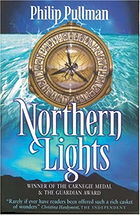 Posted : 19 years ago on 16 June 2006 10:40
(A review of Northern Lights (His Dark Materials))
Posted : 19 years ago on 16 June 2006 10:40
(A review of Northern Lights (His Dark Materials))Northern Lights (US title: the golden Compass) is the first book in the His Dark Materials trilogy (before The Subtle Knife, and The Amber Spyglass).
Set at the turn of the twentieth century in an alternate Europe where everyone is inseparable from their animal daemons, shape-changers that only settle at puberty, this is the story of Lyra Belacqua (and her daemon Pantalaimon), a teenage orphan girl living in Oxford College in charge of her powerful uncle, Lord Asriel.
Being a curious little girl, Lyra hears lots of gossip in the old halls. Some, about Dust, as well as pictures of a mysterious floating city in the aurora, make her dream of travelling North on one of her uncle's expeditions. But soon she also hears rumours of children, mainly from Gyptian families, who have started to mysteriously disappear, lured and captured by what people call the "Gobblers".
And when her playmate Roger the kitchen boy is kidnapped, she's desperate. But at the same time arrives Mrs. Coulter, an elegant and fascinatingly intelligent woman, who wants to take Lyra to her school in London. Believing that she'll learn more about Dust and maybe travel North with her, she soon becomes Mrs. Coulter's protégée. Until she realizes that the woman is none other than the head of the General Oblation Board of London, in other words the "Gobblers", and runs away.
The rest of the story tells how Lyra finally travels to Lapland, setting out in search of Roger and the other missing children with the help of the Gyptians, with whom she first takes refuge, of Panserborne (armoured bears) and witch-queens, and of the alethiometer, a strange compass-like device that reveals the truth to anyone who can read it, which the Master of Oxford College secretly gave her just before she left. Little by little, she'll become caught up in the adults' intricate powerplay.
I liked Northern Lights (US title: The Golden Compass), and found it quite pleasant to read, but I wasn't overly captivated by it. I was moved by Lyra's friendship with Iorek Byrnison, an exiled Panserborne, and deeply shocked, appalled, when I discovered what the "Gobblers" do to the snatched children, but that's about it. Lyra's a tad too temerarious and quick-witted, and in the end, I found her hardly believable. I'm very fond of Pantalaimon though.
Set at the turn of the twentieth century in an alternate Europe where everyone is inseparable from their animal daemons, shape-changers that only settle at puberty, this is the story of Lyra Belacqua (and her daemon Pantalaimon), a teenage orphan girl living in Oxford College in charge of her powerful uncle, Lord Asriel.
Being a curious little girl, Lyra hears lots of gossip in the old halls. Some, about Dust, as well as pictures of a mysterious floating city in the aurora, make her dream of travelling North on one of her uncle's expeditions. But soon she also hears rumours of children, mainly from Gyptian families, who have started to mysteriously disappear, lured and captured by what people call the "Gobblers".
And when her playmate Roger the kitchen boy is kidnapped, she's desperate. But at the same time arrives Mrs. Coulter, an elegant and fascinatingly intelligent woman, who wants to take Lyra to her school in London. Believing that she'll learn more about Dust and maybe travel North with her, she soon becomes Mrs. Coulter's protégée. Until she realizes that the woman is none other than the head of the General Oblation Board of London, in other words the "Gobblers", and runs away.
The rest of the story tells how Lyra finally travels to Lapland, setting out in search of Roger and the other missing children with the help of the Gyptians, with whom she first takes refuge, of Panserborne (armoured bears) and witch-queens, and of the alethiometer, a strange compass-like device that reveals the truth to anyone who can read it, which the Master of Oxford College secretly gave her just before she left. Little by little, she'll become caught up in the adults' intricate powerplay.
I liked Northern Lights (US title: The Golden Compass), and found it quite pleasant to read, but I wasn't overly captivated by it. I was moved by Lyra's friendship with Iorek Byrnison, an exiled Panserborne, and deeply shocked, appalled, when I discovered what the "Gobblers" do to the snatched children, but that's about it. Lyra's a tad too temerarious and quick-witted, and in the end, I found her hardly believable. I'm very fond of Pantalaimon though.
 0 comments, Reply to this entry
0 comments, Reply to this entry
Not what I expected.
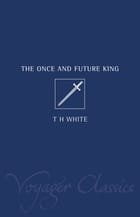 Posted : 19 years ago on 16 June 2006 10:37
(A review of Voyager Classics - The Once and Future King)
Posted : 19 years ago on 16 June 2006 10:37
(A review of Voyager Classics - The Once and Future King)The Sword in the Stone: Ornithology disguised as fantasy.
The Wart is a young orphan boy who lives in the castle of Sir Ector, his foster father. The son of the latter, Kay, is his best friend and model, for one day he will be Sir Kay, the master of the estate.
One day, they decide to go hawking together on the edge of the Forest Sauvage, but they're inexperienced and Cully the hawk flies away. They have no choice but to enter the foreboding woods and go after it. And soon the Wart gets lost. In the forest, he meets with King Pellinore, whose Quest is to catch the Beast Glatisant, and later with Merlyn the Enchanter, who brings him back to the castle and becomes his tutor.
As the Wart gets turned successively into a fish, a merlin, an ant, yet several other species of birds and finally a badger to add to his education, the novel itself sort of turns into a book of natural science, more than an actual fantasy, and not much else happens. The author's tendency to address to the reader is somewhat annoying too, and in general The Sword in the Stone far from lived up to my expectations. Not to mention that you have to wait until the fifth to last page for the Wart to finally remove the actual sword from the stone.
The Witch in the Wood (also sometimes called The Queen of Air and Darkness): Funny with boring interludes.
Young Arthur is now King of England, but finds himself in times of great political unrest. Wondering, and not understanding, why people wage war on each other, he wants to create an order of chivalry where good deeds would be rewarded.
In the meantine four boys, Gawaine, Agravaine, Gaheris and Gareth, are up to some mischief to get their mother's attention. But Queen Morgause of the Outer Ilses, who's also a witch, is too eager on avenging her father's death and on having Uther Pendragon's heir pay for her mother's miserable life.
The pace of this book is very irregular, and I found the author's numerous references to his own times (the late 1930's) useless and rather annoying. However, I enjoyed some chapters a lot, especially the hilarious one where King Pellinore is in love and depressed, and Sir Palomides and Sir Grummore desguise as the Questing Beast to cheer him up, to finally have the Beast fall in love with them.
The Ill-Made Knight: Unexpectedly passionating.
The Ill-Made Knight tells the story of the life of Sir Lancelot, an ugly young man, fervent admirer of King Arthur, who comes to Camelot to become a Knight of the Round Table.
It won't be long until he and Arthur's Queen, Guenever, fall in love with each other. And soon Sir Lancelot is tormented by a devastating inner struggle. He is thoroughly ashamed of this love, which he considers a sin. So for his redemption, he swears to become the best knight in the world.
As for King Arthur, his knights have been busy restoring peace in all Europe, but soon the situation gets out of hand again, and he has to find something to keep them from fighting each other. He'll send them on a quest for the Holy Grail.
I was quite surprised by this book, which I enjoyed much more than the previous two. There's action at last, the characters are better defined, the story more gripping. I wonder what the last two have in store for me.
The Candle in the Wind: Enthralling and tragic.
This is the fourth book in The Once and Future King pentalogy (after The Sword in the Stone, The Witch in the Wood and The Ill-Made Knight, and before The Book of Merlyn).
This volume tells the story of a Mordred on the onset of madness, of his attempts to overthrow his own father King Arthur out of thirst for power, and hatred for trying to drown him as a baby, by exposing Lancelot and Guenever's treason.
As the story flows, Arthur slowly witnesses the fall of the Round Table, sees the work of a lifetime, his ideal of Justice, and everything he has ever fought for, collapse.
The Candle in the Wind is an enthralling tragedy, ending in a wonderful speech against war, against all wars, which seem to rise again despite humanity's innumerable attempts to eradicate them. I read it avidly.
The Wart is a young orphan boy who lives in the castle of Sir Ector, his foster father. The son of the latter, Kay, is his best friend and model, for one day he will be Sir Kay, the master of the estate.
One day, they decide to go hawking together on the edge of the Forest Sauvage, but they're inexperienced and Cully the hawk flies away. They have no choice but to enter the foreboding woods and go after it. And soon the Wart gets lost. In the forest, he meets with King Pellinore, whose Quest is to catch the Beast Glatisant, and later with Merlyn the Enchanter, who brings him back to the castle and becomes his tutor.
As the Wart gets turned successively into a fish, a merlin, an ant, yet several other species of birds and finally a badger to add to his education, the novel itself sort of turns into a book of natural science, more than an actual fantasy, and not much else happens. The author's tendency to address to the reader is somewhat annoying too, and in general The Sword in the Stone far from lived up to my expectations. Not to mention that you have to wait until the fifth to last page for the Wart to finally remove the actual sword from the stone.
The Witch in the Wood (also sometimes called The Queen of Air and Darkness): Funny with boring interludes.
Young Arthur is now King of England, but finds himself in times of great political unrest. Wondering, and not understanding, why people wage war on each other, he wants to create an order of chivalry where good deeds would be rewarded.
In the meantine four boys, Gawaine, Agravaine, Gaheris and Gareth, are up to some mischief to get their mother's attention. But Queen Morgause of the Outer Ilses, who's also a witch, is too eager on avenging her father's death and on having Uther Pendragon's heir pay for her mother's miserable life.
The pace of this book is very irregular, and I found the author's numerous references to his own times (the late 1930's) useless and rather annoying. However, I enjoyed some chapters a lot, especially the hilarious one where King Pellinore is in love and depressed, and Sir Palomides and Sir Grummore desguise as the Questing Beast to cheer him up, to finally have the Beast fall in love with them.
The Ill-Made Knight: Unexpectedly passionating.
The Ill-Made Knight tells the story of the life of Sir Lancelot, an ugly young man, fervent admirer of King Arthur, who comes to Camelot to become a Knight of the Round Table.
It won't be long until he and Arthur's Queen, Guenever, fall in love with each other. And soon Sir Lancelot is tormented by a devastating inner struggle. He is thoroughly ashamed of this love, which he considers a sin. So for his redemption, he swears to become the best knight in the world.
As for King Arthur, his knights have been busy restoring peace in all Europe, but soon the situation gets out of hand again, and he has to find something to keep them from fighting each other. He'll send them on a quest for the Holy Grail.
I was quite surprised by this book, which I enjoyed much more than the previous two. There's action at last, the characters are better defined, the story more gripping. I wonder what the last two have in store for me.
The Candle in the Wind: Enthralling and tragic.
This is the fourth book in The Once and Future King pentalogy (after The Sword in the Stone, The Witch in the Wood and The Ill-Made Knight, and before The Book of Merlyn).
This volume tells the story of a Mordred on the onset of madness, of his attempts to overthrow his own father King Arthur out of thirst for power, and hatred for trying to drown him as a baby, by exposing Lancelot and Guenever's treason.
As the story flows, Arthur slowly witnesses the fall of the Round Table, sees the work of a lifetime, his ideal of Justice, and everything he has ever fought for, collapse.
The Candle in the Wind is an enthralling tragedy, ending in a wonderful speech against war, against all wars, which seem to rise again despite humanity's innumerable attempts to eradicate them. I read it avidly.
 0 comments, Reply to this entry
0 comments, Reply to this entry
Deceptive
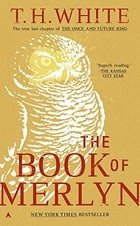 Posted : 19 years ago on 16 June 2006 10:33
(A review of The Book of Merlyn (Once and Future King))
Posted : 19 years ago on 16 June 2006 10:33
(A review of The Book of Merlyn (Once and Future King))This is the fifth and final volume in The Once and Future King pantalogy (after The Sword in the Stone, The Witch in the Wood, The Ill-Made Knight and The Candle in the Wind).
The day before the final confrontation with his son Mordred, Arthur follows Merlyn to the Combination Room, where lives his menagerie. There he listens to the magician and Archimedes, Badger, Urchin and so on, who are in a political debate on how the human way of considering life and the world is different from that of animals.
I was disappointed with the Book of Merlyn, which in fact is hardly a novel. Merlyn's supposedly natural history lesson is but an excuse for discoursing on war and the bellicosity of Man. The only passages where there's an actual story are when Arthur visits the ant nest and travels with the wild geese, but these chapters were already included in The Sword in the Stone. As for what happened to Lancelot and Guenever, it is briefly mentioned in the manner of history books. The introduction on T. H. White's life is interesting, and there are some nice illustrations, but as a whole I found nothing worth recommending this book.
The day before the final confrontation with his son Mordred, Arthur follows Merlyn to the Combination Room, where lives his menagerie. There he listens to the magician and Archimedes, Badger, Urchin and so on, who are in a political debate on how the human way of considering life and the world is different from that of animals.
I was disappointed with the Book of Merlyn, which in fact is hardly a novel. Merlyn's supposedly natural history lesson is but an excuse for discoursing on war and the bellicosity of Man. The only passages where there's an actual story are when Arthur visits the ant nest and travels with the wild geese, but these chapters were already included in The Sword in the Stone. As for what happened to Lancelot and Guenever, it is briefly mentioned in the manner of history books. The introduction on T. H. White's life is interesting, and there are some nice illustrations, but as a whole I found nothing worth recommending this book.
 0 comments, Reply to this entry
0 comments, Reply to this entry
Timeless Masterpiece!
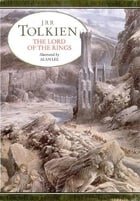 Posted : 19 years ago on 15 June 2006 04:31
(A review of The Lord of the Rings - illustrated hardback)
Posted : 19 years ago on 15 June 2006 04:31
(A review of The Lord of the Rings - illustrated hardback)The Fellowship of the Ring tells the story of the Hobbit Frodo Baggins and of how he discovers that the invisibility ring handed down to him by his uncle Bilbo is in fact the One Ring of Power, the most dangerous of artifacts, forged by the evil lord Sauron to ensnare all the peoples of Middle-Earth and bent them to his will. It has to be destroyed! Following Gandalf the old Wizard's advice, Frodo leaves his quiet Hobbit hole in the Shire and with three of his friends, makes for Rivendell to seek the Elves' counsel. There he volunteers to be the Ring-Bearer, the one who must destroy the Ring by casting into the very fire in which it was forged, in the furnaces of Mount Doom. With eight companions, he sets off on a most perilous quest, over mountains and under them, on rivers and through forests beautiful beyond words, to the heart of Mordor.
The adventure goes on in The Two Towers. The Fellowship has just been broken, and as the Hobbits Merry and Pippin are captured by Orcs to be brought to the traitor wizard Saruman, now the ally of Sauron, Frodo and his friend Sam are slowly making their way through desolate plains and treacherous bogs, to Mordor. Soon they realize that Gollum, a nasty creature who once possessed the Ring, is following them. Captured, and still under the irresistible lure of the Ring, the twisted wretch agrees to become their guide to the forsaken land. Meanwhile Aragorn the Heir of Kings, Legolas the Elf and Gimli the Dwarf are running across the grassy plains of Rohan, the domain of the Rohirrim horse masters, to rescue Merry and Pippin and later help Théoden, King of Rohan, defend his people against Saruman's army in the battle of Helm's Deep.
In The Return of the King, as Frodo and Sam are ineluctably treading closer to the heart of danger, putting the goal of their quest in jeopardy every day a little bit more as Frodo's mind threatens to give in to the power of the Ring, Aragorn and his companions must defend the beautiful white city of Minas Tirith, capital of Gondor, in a hopeless struggle against Sauron's reckless army of berserkers.
How does one go about writing a review of such a masterpiece, now that The Lord of the Rings is not only the second most read book of the twentieth century (after the Bible), but also a blockbuster movie trilogy? How does one do it justice? One just can't. That's it, I admit defeat. I simply lack superlatives to describe the tidal waves of emotions that overwhelm me each time I read this book. So I'll just say this: read it. And re-read it. And again.
The Lord of the Rings is timeless, atemporal. Even though Tolkien himself was notoriously not fond of allegories, I can't help seeing that, in these dark and sad days of our time, it stands as a beacon, a bright message of peace, telling us that even when evil and fear threatens to drown us all, there's still hope... May it be tomorrow's Bible.
The adventure goes on in The Two Towers. The Fellowship has just been broken, and as the Hobbits Merry and Pippin are captured by Orcs to be brought to the traitor wizard Saruman, now the ally of Sauron, Frodo and his friend Sam are slowly making their way through desolate plains and treacherous bogs, to Mordor. Soon they realize that Gollum, a nasty creature who once possessed the Ring, is following them. Captured, and still under the irresistible lure of the Ring, the twisted wretch agrees to become their guide to the forsaken land. Meanwhile Aragorn the Heir of Kings, Legolas the Elf and Gimli the Dwarf are running across the grassy plains of Rohan, the domain of the Rohirrim horse masters, to rescue Merry and Pippin and later help Théoden, King of Rohan, defend his people against Saruman's army in the battle of Helm's Deep.
In The Return of the King, as Frodo and Sam are ineluctably treading closer to the heart of danger, putting the goal of their quest in jeopardy every day a little bit more as Frodo's mind threatens to give in to the power of the Ring, Aragorn and his companions must defend the beautiful white city of Minas Tirith, capital of Gondor, in a hopeless struggle against Sauron's reckless army of berserkers.
How does one go about writing a review of such a masterpiece, now that The Lord of the Rings is not only the second most read book of the twentieth century (after the Bible), but also a blockbuster movie trilogy? How does one do it justice? One just can't. That's it, I admit defeat. I simply lack superlatives to describe the tidal waves of emotions that overwhelm me each time I read this book. So I'll just say this: read it. And re-read it. And again.
The Lord of the Rings is timeless, atemporal. Even though Tolkien himself was notoriously not fond of allegories, I can't help seeing that, in these dark and sad days of our time, it stands as a beacon, a bright message of peace, telling us that even when evil and fear threatens to drown us all, there's still hope... May it be tomorrow's Bible.
 0 comments, Reply to this entry
0 comments, Reply to this entry
Disappointing.
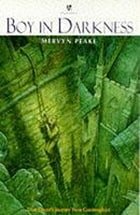 Posted : 19 years, 1 month ago on 21 May 2006 06:37
(A review of Boy in Darkness (Signature))
Posted : 19 years, 1 month ago on 21 May 2006 06:37
(A review of Boy in Darkness (Signature))This is the story of a Boy on the run from his home, the Castle, on the night of his fourteenth birthday. He soon becomes tired and hungry, and led across a lake by a pack of hounds, he meets a couple of anthropomorphic beasts, a Goat and a Hyena, who take him to their Underground Kingdom to their ghastly sovereign, the Blind Lamb.
Although no names are ever mentioned, for those familiar with Mervyn Peake's Gormenghast trilogy, it is quite clear right from the start that the Boy is in fact none other than Titus, the seventy-seventh Earl of Groan, shunning the immemorial, oppressive Ritual. And indeed (and from the book cover too) I was expecting, and looking forward to, more exploration of the labyrinthine fortress. I was disappointed though, as Boy in Darkness is just a dream-like, surrealist fable with little in common with the trilogy. It is short, and can be read as a stand-alone, but I strongly recommend reading the Gormenghast trilogy too (or instead).
Although no names are ever mentioned, for those familiar with Mervyn Peake's Gormenghast trilogy, it is quite clear right from the start that the Boy is in fact none other than Titus, the seventy-seventh Earl of Groan, shunning the immemorial, oppressive Ritual. And indeed (and from the book cover too) I was expecting, and looking forward to, more exploration of the labyrinthine fortress. I was disappointed though, as Boy in Darkness is just a dream-like, surrealist fable with little in common with the trilogy. It is short, and can be read as a stand-alone, but I strongly recommend reading the Gormenghast trilogy too (or instead).
 0 comments, Reply to this entry
0 comments, Reply to this entry
Frustrating.
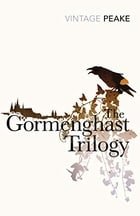 Posted : 19 years, 1 month ago on 21 May 2006 06:36
(A review of The Gormenghast Trilogy)
Posted : 19 years, 1 month ago on 21 May 2006 06:36
(A review of The Gormenghast Trilogy)Titus Alone is the third and last volume of the Gormenghast trilogy (after Titus Groan, and Gormenghast).
In this book, we follow Titus, now almost twenty, as he escapes from the Castle, flees its oppressive Ritual, and becomes lost in a sandstorm. Helped by the owner of a travelling zoo, Muzzlehatch, and his ex-lover Juno, he ends up in a big city. Of course, no one there has ever heard of Gormenghast, and the general opinion is that the boy is deranged, and with no paper, he's soon arrested for vagrancy.
Hopefully, there are a few people who believe in his story, or at least who are intrigued by it, and they try to help him. And now Titus, the deserter, the traitor, longs for his home, and looks for it all the time to prove, if only to himself, that Gormenghast is truly real.
I don't know how closely Titus Alone actually follows Mervyn Peake's intentions before mental illness struck him, but this final volume is indeed chaotic. Its characters and style, its setting and atmosphere have little to do with both previous books. Or maybe it's just me who didn't understand anything, but nevertheless, all I felt was bitter frustration.
In this book, we follow Titus, now almost twenty, as he escapes from the Castle, flees its oppressive Ritual, and becomes lost in a sandstorm. Helped by the owner of a travelling zoo, Muzzlehatch, and his ex-lover Juno, he ends up in a big city. Of course, no one there has ever heard of Gormenghast, and the general opinion is that the boy is deranged, and with no paper, he's soon arrested for vagrancy.
Hopefully, there are a few people who believe in his story, or at least who are intrigued by it, and they try to help him. And now Titus, the deserter, the traitor, longs for his home, and looks for it all the time to prove, if only to himself, that Gormenghast is truly real.
I don't know how closely Titus Alone actually follows Mervyn Peake's intentions before mental illness struck him, but this final volume is indeed chaotic. Its characters and style, its setting and atmosphere have little to do with both previous books. Or maybe it's just me who didn't understand anything, but nevertheless, all I felt was bitter frustration.
 0 comments, Reply to this entry
0 comments, Reply to this entry
Intoxicating.
 Posted : 19 years, 1 month ago on 21 May 2006 06:35
(A review of The Gormenghast Trilogy)
Posted : 19 years, 1 month ago on 21 May 2006 06:35
(A review of The Gormenghast Trilogy)Gormenghast is the second part of the Gormenghast trilogy (after Titus Groan, and before Titus Alone).
After a somewhat slow beginning, in which Mervyn Peake first briefly summarizes Titus Grown by drawing up a list of which characters have died or gone missing, then introduces the reader with the plethora of new characters that are the teachers of Titus, the now seven-year-old seventy-seventh Earl of Gormenghast, the pace hopefully picks up again. And as the pages turn, the story becomes more and more exciting.
Irma Prunesquallor's party, and then her romance and the way the whole affair eventually backfires on Wellgrove, although it does not push the plot further, were fun to read. Titus's growing love for his sister Fuchsia, and at the same time his attempts at shunning both the physical prison that is Gormenghast castle and the mental cage that is its sacrosanct ritual, attempts that lead him into the mysterious forest where lurks the Thing, and to the grotto where Flay has taken shelter, were passionating. Finally, Steerpike's mischievious, murderous ambition, and the others' suspicions that gradually turn into evidences, and the memorable chases in the shadowy maze of the fortress that ensue, were purely mind-boggling.
Mervyn Peake's characters are so complex that in the end you like the ones you despised and hate the ones you loved in the first book. His words give life to such an amazing imagery, it vibrates and dazzles, it's intoxicating. This is magic.
After a somewhat slow beginning, in which Mervyn Peake first briefly summarizes Titus Grown by drawing up a list of which characters have died or gone missing, then introduces the reader with the plethora of new characters that are the teachers of Titus, the now seven-year-old seventy-seventh Earl of Gormenghast, the pace hopefully picks up again. And as the pages turn, the story becomes more and more exciting.
Irma Prunesquallor's party, and then her romance and the way the whole affair eventually backfires on Wellgrove, although it does not push the plot further, were fun to read. Titus's growing love for his sister Fuchsia, and at the same time his attempts at shunning both the physical prison that is Gormenghast castle and the mental cage that is its sacrosanct ritual, attempts that lead him into the mysterious forest where lurks the Thing, and to the grotto where Flay has taken shelter, were passionating. Finally, Steerpike's mischievious, murderous ambition, and the others' suspicions that gradually turn into evidences, and the memorable chases in the shadowy maze of the fortress that ensue, were purely mind-boggling.
Mervyn Peake's characters are so complex that in the end you like the ones you despised and hate the ones you loved in the first book. His words give life to such an amazing imagery, it vibrates and dazzles, it's intoxicating. This is magic.
 0 comments, Reply to this entry
0 comments, Reply to this entry
 Login
Login
 Home
Home 7 Lists
7 Lists 198 Reviews
198 Reviews Collections
Collections